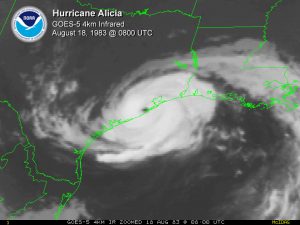
As a pastor, I shepherded two churches through two natural disasters: a hurricane and a once-in-500-year flood. Because I wasn’t prepared, I didn’t do well at all when hurricane Alicia hit Hitchcock, Texas in 1983. My ignorance and unpreparedness paralyzed me and kept me from providing any meaningful response. Ten years later I was a pastor in Quincy, Illinois when The Great Flood of ’93 hit the upper Mississippi. It destroyed 600 homes in our area alone and flooded access to our two bridges for three months. I took the lessons I learned from the first disaster and applied them to the second and my response was much more effective.
Here’s what I’ve learned from both of these disasters.
Before a Disaster
- Preach and teach on the topic. The Bible is full of passages that teach that we are not to take life for granted and that we are to help each other in times of great need.
- Collect the email addresses and cell phone numbers of all parishioners. These will be invaluable if your congregation winds up being dispersed.
- Backup your church’s data online and offsite. Backing up to an external hard drive is good, but it won’t protect against fire and theft.
- Update and maintain your church’s insurance. During Hurricane Alicia, one church near us was in the middle of building a new sanctuary, but hadn’t updated their insurance. The partial building was destroyed and the church lost everything.
- Encourage your members to stockpile water and non perishable food. Always a good idea.
- Register your church with the Red Cross as a shelter. Providing shelter in emergencies may be one of the most helpful things your church can do.
- Educate your church on the disaster potential for your area. Different regions of the country have different potential disasters. St. Louis, for example, won’t see hurricanes, while it has seen flooding and tornadoes. But many Midwesterners are unaware that the largest earthquake in America occurred on the New Madrid Fault, near St. Louis.
- Have specific responses ready for specific disasters. Know which potential disasters may affect your area and learn how to respond to them.
- Establish a local church network for disaster response. Churches are some of the most effective community organizations for mitigating disasters. When churches combine resources, they become even more effective.
- Invite local government officials to speak to your church leadership and/or local ministerial alliance on disaster preparedness. The appropriate government officials will be happy to help prepare your church for disasters.
- Don’t get weird. Preparing for disasters can be overdone.
After a disaster
- Contact parishioners as quickly as possible. Knowing that you care enough to contact your members quickly will be a source of great comfort.
- Assess the damage. Prioritize according to need.
- Be a communications center and help your members and those in your community network with each other. If your church building is functional, offer it as a community meeting place.
- Be people-centered, then property-centered. Understand the stress and spiritual trials your flock may be going through. Minister to spiritual and emotional needs first, then focus on the physical needs. Disasters create immense opportunities for ministry and drawing people to Christ.
- In an extended disaster recovery, consider filling your pulpit with outside speakers after the first few weeks. Your congregation will want to hear from you in the first week or two. But if the recovery period stretches on for weeks or months, consider bringing someone in. Major disasters will be exceedingly draining for pastors as they seek to minister to a traumatized flock. A reduced pulpit load can help.
- If you haven’t already, form a church network as quickly as possible. Following the Great Flood of 93, our church formed an alliance with other churches, making it possible for major national charities to channel their funds through us.
- Contact charity organizations for help. During major disasters, charities are often inundated with donations. By contacting them, you give these charities valid outlets for those funds.
- Contact nearby, but unaffected, churches for help. Some of the most effective help can come from churches just up the road from yours. Ask a large and prosperous church in your region to adopt your church. Then give them a list of specific needs. Invite them to send volunteers to help.
- Be flexible and use your creativity. By nature, disasters are unpredictable. A rigid response can be counter productive.
Your church will function much more effectively and efficiently – and honor our Lord in the process – by taking these simple steps before and after disasters.
This post first appeared in NewCommandment.org.
Has your church experienced a disaster? How did you and your congregation respond?
_______________________________________________________________

Learn how to form teams of men for every widow, single mom
and fatherless child in your church at NewCommandment.org.
_______________________________________________________________
One thought on “Are You a Pastor of Disaster? Preparing Your Church for the Next Traumatic Event”